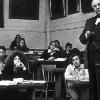Storytelling in Appellate Brief Writing
 At the end of July, both Professor Michael Smith and I attended the Applied Legal Storytelling Conference at Lewis and Clark Law School in Portland, Oregon. The conference was entitled “Chapter 2: Once Upon a Legal Story” and focused on storytelling in “ways that will directly and tangibly benefit law students (i.e. future lawyers) and legal practitioners (i.e. former law students).” The presentations I attended addressed ways to use storytelling to create a stronger narrative theme in a case and how to handle the ethical issues in storytelling.
At the end of July, both Professor Michael Smith and I attended the Applied Legal Storytelling Conference at Lewis and Clark Law School in Portland, Oregon. The conference was entitled “Chapter 2: Once Upon a Legal Story” and focused on storytelling in “ways that will directly and tangibly benefit law students (i.e. future lawyers) and legal practitioners (i.e. former law students).” The presentations I attended addressed ways to use storytelling to create a stronger narrative theme in a case and how to handle the ethical issues in storytelling.
One of the most intriguing presentations was Professor Kenneth Chestek’s talk “Judging by the Numbers: an Empirical Study of the Power of Story.” Professor Chestek conducted a study where he wrote four fictional test briefs: two that focused heavily on stating the law and applying it (the “pure logos” briefs), and two that focused on creating a narrative story into which the law was inserted and applied (the “story” briefs). (He wrote a logos brief and a story brief for both the petitioner and respondent.) Professor Chestek solicited appellate practitioners, appellate judges, appellate judicial law clerks, appellate court staff attorneys, and legal writing professors to read these briefs and rate their strength of persuasion. The participants knew they were taking part in a study, but they did not know who was conducting the study or what the purpose of the study was.

 As we officially open the school year, I have been thinking a lot about what are the secrets to success in law school. I understand that Dean Rofes spoke at Orientation about the sausage races at Miller Park. (I personally always root for the Chorizo Sausage!) Law school may sometimes feel a bit like a race, or, to think more classically about Aesop’s fables, like the story of the Tortoise and the Hare. In that story, the tortoise ultimately wins the race using slow and steady steps to the finish line.
As we officially open the school year, I have been thinking a lot about what are the secrets to success in law school. I understand that Dean Rofes spoke at Orientation about the sausage races at Miller Park. (I personally always root for the Chorizo Sausage!) Law school may sometimes feel a bit like a race, or, to think more classically about Aesop’s fables, like the story of the Tortoise and the Hare. In that story, the tortoise ultimately wins the race using slow and steady steps to the finish line. This fall, Marquette University Law School is fortunate to have Professor Michael R. Smith as a Robert E. Boden Visiting Professor of Law. Professor Smith is visiting from the University of Wyoming College of Law, where he is the Winston S. Howard Distinguished Professor of Law and the Director of Legal Writing. Professor Smith’s work in legal writing and written advocacy is nationally renowned. He has published a book on persuasive legal writing entitled Advanced Legal Writing: Theories and Strategies in Persuasive Writing (Aspen 2002). This book has received such interest and acclaim that the release of the second edition was the impetus for a 2008 conference, A Dialogue About Persuasion in Legal Writing & Lawyering, which was held at Rutgers Law School-Camden.
This fall, Marquette University Law School is fortunate to have Professor Michael R. Smith as a Robert E. Boden Visiting Professor of Law. Professor Smith is visiting from the University of Wyoming College of Law, where he is the Winston S. Howard Distinguished Professor of Law and the Director of Legal Writing. Professor Smith’s work in legal writing and written advocacy is nationally renowned. He has published a book on persuasive legal writing entitled Advanced Legal Writing: Theories and Strategies in Persuasive Writing (Aspen 2002). This book has received such interest and acclaim that the release of the second edition was the impetus for a 2008 conference, A Dialogue About Persuasion in Legal Writing & Lawyering, which was held at Rutgers Law School-Camden.